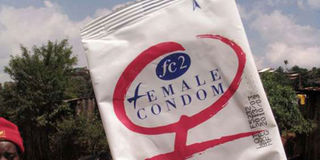Experts to discuss role of female condom at global forum in Durban

A female condom. As the world celebrates Aids Day on December 1, 2015, organisers of the Global Female Condom Conference have said that female condoms are still a highly underestimated protection method. PHOTO | JOSEPH KANYI | NATION MEDIA GROUP
What you need to know:
- The conference which kicked off Monday morning is organised by four non-governmental organisations working in the field of sexual and reproductive health and rights.
- In sub-Saharan Africa, where 61 per cent of all new HIV infections occur among women, the female condom provides a method that can help to reduce these alarming numbers.
- Female condoms have been around for twenty years, yet most women do not use them, for various reasons.
- Dr Beksinska said the governments of South Africa and Brazil, which have the largest female condom programmes globally, will share their experiences.
Experts and policy makers from all over the world converge in Durban, South Africa to discuss and explore a bigger role for the female condom in prevention of HIV/AIDS and unintended pregnancies.
As the world celebrates Aids Day on Tuesday, organisers of the Global Female Condom Conference have said that female condoms are still a highly underestimated protection method.
Although female condoms prevent both pregnancies and infections and give women more control over protection during sex, accessibility is still limited.
The conference which kicked off Monday morning is organised by four non-governmental organisations working in the field of sexual and reproductive health and rights.
The four are Universal Access to Female Condoms Joint Programme (The Netherlands), MatCH Research (South Africa), CHANGE (United States) and PSI (global).
REPRODUCTIVE HEALTH NEEDS
According to Mrs Greetje Lubbi, the chairman of the international steering group, the Universal Access to Female Condoms Joint Programme (UAFC), there are around 200 million women whose reproductive health needs are not met and many young people have not yet heard about the dual protection method.
“With this conference we aim to initiate new activities and collaborations on the benefit of female condoms, innovate our ways of working by learning from each other and integrate female condoms in all relevant programmes and advocacy,” she said in a statement.
According to the Global Female Condom Conference, millions of people worldwide struggle daily with the consequences of unprotected sex, sexually transmitted infections and unintended pregnancies which have a devastating impact on human lives as well as the economies of countries.
Currently the female condom is the only female-initiated prevention method that provides double protection against both pregnancy and sexual transmitted diseases.
According to the conference organizers, over 215 million women worldwide do not have access to contraceptives and one third of all pregnancies are unintended (and many unwanted).
In sub-Saharan Africa, where 61 per cent of all new HIV infections occur among women, the female condom provides a method that can help to reduce these alarming numbers.
Female condoms have been around for twenty years, yet most women do not use them, for various reasons.
New woman-initiated technologies such as microbicides will not be available for some years, but female condoms exist here and now, and studies have shown that users find them highly acceptable.
DUAL PROTECTION METHOD
According to Dr Dr Mags Beksinska, the Director of the Maternal Adolescent and Child Health Research (MatCH Research), major steps have been made towards universal access to the only dual protection method that women can initiate themselves.
However, the goal is yet to be realised.
Dr Beksinska, who is also a member of the Global Female Conference 2015 Steering Committee, said more work is needed to initiate, innovate and integrate this contraceptive life-saver.
"The Global Female Condom Conference 2015 will be a vital opportunity to contribute to this mission.
“The conference offers a varied programme with scientific presentations, discussion panels, interactive workshops and much more.
“A diverse audience, from policy makers to programmers and researchers, will participate,” read her statement.
The three day meeting which is being held at the Coastlands Umhlanga Hotel & Convention Centre, 329 Umhlanga Rocks Drive ends on December 3, 2015.
Dr Beksinska said the governments of South Africa and Brazil, which have the largest female condom programmes globally, will share their experiences.





